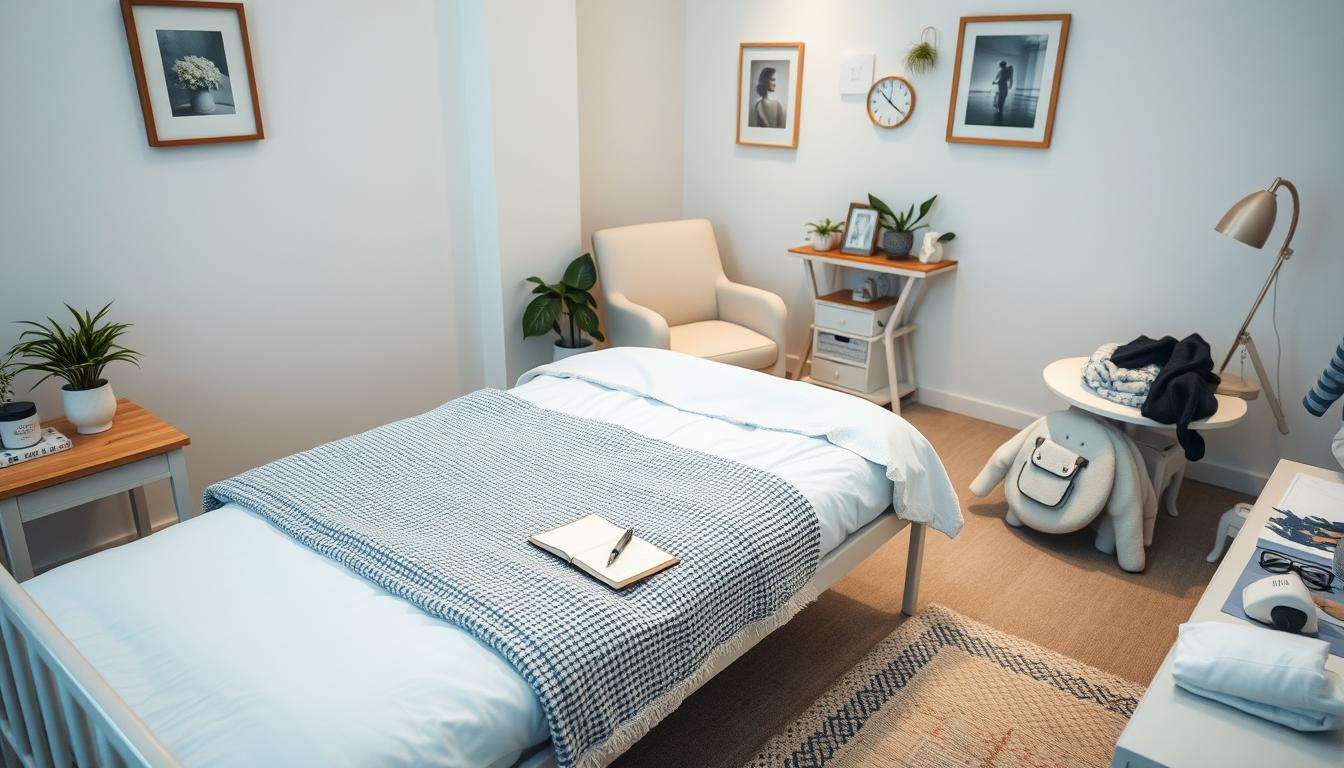Embrace Men’s Mental Health: Resources and Support

When thinking about your well-being, remember the importance of men’s mental health. Men’s mental health month is a time to focus on health issues that affect men. Good mental health lets you work well, handle life’s stresses, and reach your full ability. It’s key for a good life and keeps you physically healthy too.
About six million men struggle with depression each year, but many don’t get help.
It’s vital to know that mental health is as important as physical health. Sadly, over 40% of men don’t talk about their mental health. And the same number say they’ll only seek help if they’re really struggling. We need to encourage men to talk about their mental health more.
Men’s mental health month is all about raising awareness about men’s health issues.
By understanding the importance of men’s mental health matters, we can start making a difference. In the U.S., more than four times as many men as women die by suicide. This shows how critical it is to support men’s mental health. Let’s make sure men get the help they need to thrive.
Key Takeaways
- Men’s mental health awareness is key for good physical health and well-being.
- Approximately six million men are impacted by depression each year, which often goes undiagnosed.
- Over 40% of men do not talk about their mental health, and the same percentage of men state that they would only seek help when experiencing serious thoughts of self-harm.
- Men’s mental health month is dedicated to raising awareness about health issues affecting men.
- More than four times as many men as women die by suicide in the United States, highlighting the need for men’s mental health awareness and support.
- Prioritizing men’s mental health awareness and providing the necessary resources and support can help men thrive.
Understanding Men’s Mental Health Month and Its Significance
Men’s Mental Health Month is in June to highlight the mental health issues men face. Men are more likely to try to kill themselves than women. They also use drugs more than women, being 2 to 3 times more likely. It’s important to help men’s mental health because they often hide their feelings due to societal expectations.
Some important facts about men’s mental health in America include:
- Men often turn to drugs instead of getting help for their mental health.
- LGBTQ+ men are more likely to have mental health issues than straight and cisgender men.
- Black, Indigenous, and People of Color (BIPOC) men face the same mental health challenges as white men but have a harder time getting help.
It’s key to reduce mental health stigma in male groups to improve their mental health. By talking openly about mental health, we can help men feel more comfortable seeking help.
| Men’s Mental Health Statistics | Percentage |
|---|---|
| Suicide rate among males | almost 80% of all suicides |
| Men with a mental health condition who received support | 40% |
Recognizing the Signs: When to Seek Support
Understanding when you need mental health support for men is key. You might need help if you get angry easily, have constant negative thoughts, or take more risks. Other signs include trouble sleeping, changes in appetite, not wanting to socialize, or enjoying activities less. It’s important to notice these signs and get help when you need it.
Men often find it hard to talk about their feelings or get help because of what society expects. But, asking for help shows you’re strong, not weak. By recognizing these signs and looking for men’s mental health resources, you can start on the path to a better life.
Some common signs of mental health issues in men include:
- Increased irritability or anger
- Changes in sleep patterns or appetite
- Loss of interest in activities or hobbies
- Difficulty concentrating or making decisions
If you’re showing any of these signs, getting help from a mental health professional is a must. They can offer the support and resources you need to manage your mental health.
Essential Resources for Supporting Your Mental Well-being
Keeping your mental health in check is a big task. You need reliable resources to help you out. Look for professional services, online communities, and tools that fit your needs.
The NAMI HelpLine is a great place to start. It’s open Monday to Friday, 10 AM to 10 PM ET. They offer support for those dealing with mental health issues, their families, and caregivers. You can also call or text 988 for help anytime.
Online communities and helplines are also there for you. The National Suicide Prevention Lifeline and SAMHSA’s National Helpline are good examples. They offer a sense of connection and support, which is key for your mental health.
Building social connections and staying active are also important. Regular physical activity can lower your risk of depression and anxiety. Adding these habits to your daily life can boost your mental health.
| Resource | Description |
|---|---|
| NAMI HelpLine | Provides support to individuals struggling with mental health issues, their families, and caregivers |
| The National Suicide Prevention Lifeline | Offers crisis counseling and support 24/7 |
| SAMHSA’s National Helpline | Provides information and referrals for mental health and substance abuse treatment |
Practical Steps to Embrace Your Mental Health Journey
Starting your mental health journey is all about taking action. It’s about focusing on your well-being and following tips to help you. First, build a strong support network. This can be friends, family, or mental health experts. They offer emotional support, guidance, and a sense of belonging.
It’s also important to develop healthy ways to cope with stress and emotions. Activities like exercise, mindfulness, or creative pursuits can help. These methods can reduce the risk of anxiety and depression. Setting realistic goals and working towards meaningful objectives also boosts your mental health.
Creating a mental wellness routine is key. This includes regular exercise, healthy eating, and enough sleep. By focusing on self-care and healthy choices, you can enhance your mental health. Remember, mental health is a journey. Be patient and kind to yourself along the way.
Here are some important tips for embracing men’s mental health:
- Practice self-compassion and accept your imperfections
- Find joy in activities that relax you
- Seek support from loved ones or mental health experts
- Make mental wellness a priority and choose healthy habits

By following these tips and focusing on your mental health, you can improve your life. Remember, it’s a journey that needs patience, kindness, and self-compassion.
| Activity | Benefits |
|---|---|
| Exercise | Reduces stress and anxiety, improves mood |
| Mindfulness | Improves emotional regulation, reduces stress |
| Healthy eating | Improves overall health, reduces risk of mental health issues |
Conclusion: Taking Action for Better Mental Health
As we wrap up Men’s Mental Health Month, remember your mental health is always important, not just in June. It’s key to understand the value of men’s mental health awareness. This awareness is vital for your overall health and happiness.
If you’re facing depression, anxiety, or other mental health issues, you’re not alone. It takes bravery to admit you need help and to seek it. Allow yourself to be open with trusted people, like a therapist, friend, or support group. Seeking help shows you’re strong, not weak.
Use the tips from this article to improve your mental health journey. Build a support network, find healthy ways to cope, and create a routine for mental wellness. By doing these things, you’ll be on the path to better mental health, not just in June, but all year.
Your mental health is important, and you should feel your best. Have the courage to put your well-being first. Let’s keep working to reduce the stigma around men’s mental health together,
FAQ
What is the definition of mental health?
Mental health is about how we feel, think, and act. It affects our life quality. It’s about our emotional, psychological, and social well-being.
Why is it important to focus on men’s mental health?
Men face unique challenges and pressures. These can harm their mental health. It’s key to support men’s mental health to improve well-being and reduce stigma.
When did Men’s Mental Health Month start, and what is its purpose?
Men’s Mental Health Month was created to raise awareness. It aims to help men get support without fear of judgment. It addresses the challenges men face.
What are some common mental health issues among men in the United States?
In the U.S., men often deal with depression, anxiety, substance abuse, and PTSD. They face these issues more than women do.
How can we break down the stigma surrounding men’s mental health?
We can challenge wrong ideas and start open talks. Encouraging men to seek help is also key. This helps reduce stigma in male communities.
What are some signs that a man may be struggling with mental health issues?
Signs include sadness, sleep changes, irritability, and trouble focusing. Men might also avoid social activities. Recognizing these signs is important.
Where can men find professional mental health services?
Men can find help from therapists and counselors who focus on men’s mental health. Online directories can help find the right providers.
What types of online support communities and helplines are available for men?
Online forums, groups, and hotlines offer support for men. They provide anonymous help, which is great for those who prefer not to seek in-person help.
What are some self-help tools and applications that can support men’s mental health?
Tools like meditation apps and mood trackers are helpful. Online therapy platforms also offer support. These tools are flexible and can be used anonymously.
How can men build a strong support network for their mental health?
Talking to trusted friends and family is important. Joining support groups can also help. Building these connections is a big step in mental health care.








